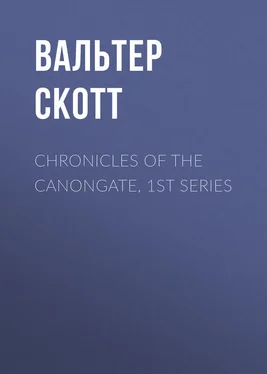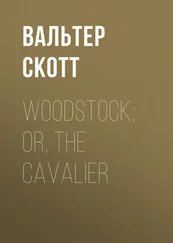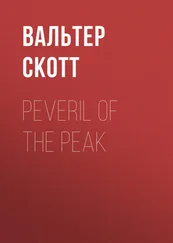Вальтер Скотт - Chronicles of the Canongate, 1st Series
Здесь есть возможность читать онлайн «Вальтер Скотт - Chronicles of the Canongate, 1st Series» — ознакомительный отрывок электронной книги совершенно бесплатно, а после прочтения отрывка купить полную версию. В некоторых случаях можно слушать аудио, скачать через торрент в формате fb2 и присутствует краткое содержание. Жанр: foreign_antique, foreign_prose, на английском языке. Описание произведения, (предисловие) а так же отзывы посетителей доступны на портале библиотеки ЛибКат.
- Название:Chronicles of the Canongate, 1st Series
- Автор:
- Жанр:
- Год:неизвестен
- ISBN:нет данных
- Рейтинг книги:4 / 5. Голосов: 1
-
Избранное:Добавить в избранное
- Отзывы:
-
Ваша оценка:
- 80
- 1
- 2
- 3
- 4
- 5
Chronicles of the Canongate, 1st Series: краткое содержание, описание и аннотация
Предлагаем к чтению аннотацию, описание, краткое содержание или предисловие (зависит от того, что написал сам автор книги «Chronicles of the Canongate, 1st Series»). Если вы не нашли необходимую информацию о книге — напишите в комментариях, мы постараемся отыскать её.
Chronicles of the Canongate, 1st Series — читать онлайн ознакомительный отрывок
Ниже представлен текст книги, разбитый по страницам. Система сохранения места последней прочитанной страницы, позволяет с удобством читать онлайн бесплатно книгу «Chronicles of the Canongate, 1st Series», без необходимости каждый раз заново искать на чём Вы остановились. Поставьте закладку, и сможете в любой момент перейти на страницу, на которой закончили чтение.
Интервал:
Закладка:
I may here also notice that the sort of exchange of gallantry which is represented as taking place betwixt the Baron of Bradwardine and Colonel Talbot, is a literal fact. The real circumstances of the anecdote, alike honourable to Whig and Tory, are these: —
Alexander Stewart of Invernahyle – a name which I cannot write without the warmest recollections of gratitude to the friend of my childhood, who first introduced me to the Highlands, their traditions, and their manners – had been engaged actively in the troubles of 1745. As he charged at the battle of Preston with his clan, the Stewarts of Appin, he saw an officer of the opposite army standing alone by a battery of four cannon, of which he discharged three on the advancing Highlanders, and then drew his sword. Invernahyle rushed on him, and required him to surrender. “Never to rebels!” was the undaunted reply, accompanied with a lunge, which the Highlander received on his target, but instead of using his sword in cutting down his now defenceless antagonist, he employed it in parrying the blow of a Lochaber axe aimed at the officer by the Miller, one of his own followers, a grim-looking old Highlander, whom I remember to have seen. Thus overpowered, Lieutenant-Colonel Allan Whitefoord, a gentleman of rank and consequence, as well as a brave officer, gave up his sword, and with it his purse and watch, which Invernahyle accepted, to save them from his followers. After the affair was over, Mr. Stewart sought out his prisoner, and they were introduced to each other by the celebrated John Roy Stewart, who acquainted Colonel Whitefoord with the quality of his captor, and made him aware of the necessity of receiving back his property, which he was inclined to leave in the hands into which it had fallen. So great became the confidence established betwixt them, that Invernahyle obtained from the Chevalier his prisoner’s freedom upon parole; and soon afterwards, having been sent back to the Highlands to raise men, he visited Colonel Whitefoord at his own house, and spent two happy days with him and his Whig friends, without thinking on either side of the civil war which was then raging.
When the battle of Culloden put an end to the hopes of Charles Edward, Invernahyle, wounded and unable to move, was borne from the field by the faithful zeal of his retainers. But as he had been a distinguished Jacobite, his family and property were exposed to the system of vindictive destruction too generally carried into execution through the country of the insurgents. It was now Colonel Whitefoord’s turn to exert himself, and he wearied all the authorities, civil and military, with his solicitations for pardon to the saver of his life, or at least for a protection for his wife and family. His applications were for a long time unsuccessful. “I was found with the mark of the Beast upon me in every list,” was Invernahyle’s expression. At length Colonel Whitefoord applied to the Duke of Cumberland, and urged his suit with every argument which he could think of, being still repulsed, he took his commission from his bosom, and having said something of his own and his family’s exertions in the cause of the House of Hanover, begged to resign his situation in their service, since he could not be permitted to show his gratitude to the person to whom he owed his life. The duke, struck with his earnestness, desired him to take up his commission, and granted the protection required for the family of Invernahyle.
The chieftain himself lay concealed in a cave near his own house, before which a small body of regular soldiers were encamped. He could hear their muster-roll called every morning, and their drums beat to quarters at night, and not a change of the sentinels escaped him. As it was suspected that he was lurking somewhere on the property, his family were closely watched, and compelled to use the utmost precaution in supplying him with food. One of his daughters, a child of eight or ten years old, was employed as the agent least likely to be suspected. She was an instance, among others, that a time of danger and difficulty creates a premature sharpness of intellect. She made herself acquainted among the soldiers, till she became so familiar to them that her motions escaped their notice; and her practice was to stroll away into the neighbourhood of the cave, and leave what slender supply of food she carried for that purpose under some remarkable stone, or the root of some tree, where her father might find it as he crept by night from his lurking-place. Times became milder, and my excellent friend was relieved from proscription by the Act of Indemnity. Such is the interesting story which I have rather injured than improved by the manner in which it is told in Waverley.
This incident, with several other circumstances illustrating the Tales in question, was communicated by me to my late lamented friend, William Erskine (a Scottish judge, by the title of Lord Kinedder), who afterwards reviewed with far too much partiality the Tales of my Landlord, for the Quarterly Review of January 1817. [Lord Kinedder died in August 1822. EHEU! (Aug. 1831.)] In the same article are contained other illustrations of the Novels, with which I supplied my accomplished friend, who took the trouble to write the review. The reader who is desirous of such information will find the original of Meg Merrilies, and, I believe, of one or two other personages of the same cast of character, in the article referred to.
I may also mention that the tragic and savage circumstances which are represented as preceding the birth of Allan MacAulay in the Legend of Montrose, really happened in the family of Stewart of Ardvoirlich. The wager about the candlesticks, whose place was supplied by Highland torch-bearers, was laid and won by one of the MacDonalds of Keppoch.
There can be but little amusement in winnowing out the few grains of truth which are contained in this mass of empty fiction. I may, however, before dismissing the subject, allude to the various localities which have been affixed to some of the scenery introduced into these Novels, by which, for example, Wolf’s Hope is identified with Fast Castle in Berwickshire, Tillietudlem with Draphane in Clydesdale, and the valley in the Monastery, called Glendearg, with the dale of the river Allan, above Lord Somerville’s villa, near Melrose. I can only say that, in these and other instances, I had no purpose of describing any particular local spot; and the resemblance must therefore be of that general kind which necessarily exists between scenes of the same character. The iron-bound coast of Scotland affords upon its headlands and promontories fifty such castles as Wolf’s Hope; every county has a valley more or less resembling Glendearg; and if castles like Tillietudlem, or mansions like the Baron of Bradwardine’s, are now less frequently to be met with, it is owing to the rage of indiscriminate destruction, which has removed or ruined so many monuments of antiquity, when they were not protected by their inaccessible situation. [I would particularly intimate the Kaim of Uric, on the eastern coast of Scotland, as having suggested an idea for the tower called Wolf’s Crag, which the public more generally identified with the ancient tower of Fast Castle.]
The scraps of poetry which have been in most cases tacked to the beginning of chapters in these Novels are sometimes quoted either from reading or from memory, but, in the general case, are pure invention. I found it too troublesome to turn to the collection of the British Poets to discover apposite mottoes, and, in the situation of the theatrical mechanist, who, when the white paper which represented his shower of snow was exhausted, continued the storm by snowing brown, I drew on my memory as long as I could, and when that failed, eked it out with invention. I believe that in some cases, where actual names are affixed to the supposed quotations, it would be to little purpose to seek them in the works of the authors referred to. In some cases I have been entertained when Dr. Watts and other graver authors have been ransacked in vain for stanzas for which the novelist alone was responsible.
Читать дальшеИнтервал:
Закладка:
Похожие книги на «Chronicles of the Canongate, 1st Series»
Представляем Вашему вниманию похожие книги на «Chronicles of the Canongate, 1st Series» списком для выбора. Мы отобрали схожую по названию и смыслу литературу в надежде предоставить читателям больше вариантов отыскать новые, интересные, ещё непрочитанные произведения.
Обсуждение, отзывы о книге «Chronicles of the Canongate, 1st Series» и просто собственные мнения читателей. Оставьте ваши комментарии, напишите, что Вы думаете о произведении, его смысле или главных героях. Укажите что конкретно понравилось, а что нет, и почему Вы так считаете.












